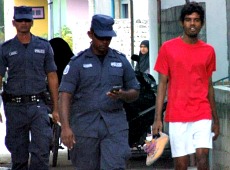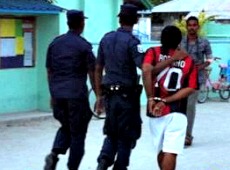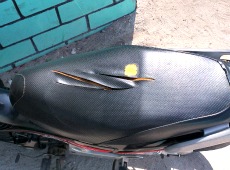With former Maldivian President Mohamed Nasheed walking out of the Indian High Commission (IHC) in Male’ as voluntarily as he entered, political tensions within the country and bilateral relations with New Delhi have eased. Hopes and expectations are that domestic stakeholders would use the coming weeks to create a violence-free, atmosphere conducive to ensuring ‘free, fair and inclusive elections’. The presidential election is tentatively scheduled for September 7, with a run-off second round, if necessary, later that month.
Nasheed’s Maldivian Democratic Party (MDP) has argued that any election without him as its nominee could not be free and fair. They fear his possible disqualification, if the pending ‘Judge Abdulla abduction’ case results in Nasheed serving a prison term exceeding one year. As the single largest political party on record – going by the number of members registered with the Election Commission and given the party’s penchant for taking to the streets – the MDP cannot not be over-looked, or left unheard.
At the same time, questions also remain if political parties can circumvent legal and judicial processes considering Nasheed faces criminal charges. The argument could apply to the presidential hopefuls of a few other existing and active political parties in the country. ‘Criminality in politics’ seemed to have preceded democracy in the country.
The current government could thus be charged with ‘selective’ application of criminal law. The MDP calls it ‘politically-motivated’. While in power, Nasheed’s Government resorted to similar tactics ad infinitum. No one had talked about ‘disqualification’ when cases did not proceed. There were charges the MDP had laid against former President Maumoon Abdul Gayoom, as well, in its formative days as a ‘pro-democracy movement’ in Maldives.
On the political plane, the reverse could be equally true. What is applicable to others should be applicable to Nasheed. Or, what is applicable to Nasheed (whatever the criminal charges) should be applicable to the rest of them as well. It would then be a question of non-sinners alone being allowed to stone a sinner! Yet, sooner or later, the Maldives as a nation will have to decide its legal position and judicial process regarding ‘accountability issues’.
Personality-driven
A national commitment to addressing ‘accountability issues’ in civilian matters, however, may have to wait until after the presidential polls this year and the subsequent parliamentary elections in May 2014. Political clarity is expected to emerge along with parliamentary stability. The ‘Judge Abdulla abduction case, in which Nasheed is accused number-one, has taken center-stage in the political campaign in the run-up to the presidential polls. Like all issues Nasheed-centric, it remains personality-driven, not probity-driven.
The 2008 Constitution, provides for multi-party elections as well as gives former presidents immunity from political decisions and criminal acts that they could otherwise be charged with during their days in office. In a grand gesture aimed at national reconciliation after a no-holds-barred poll campaign, President-elect Nasheed met with his outgoing predecessor, Gayoom, without any delay whatsoever, and promised similar immunity. President Gayoom, despite motivated speculation to the contrary, arranged for the power-transition without any hiccups.
The perceived dithering by Nasheed’s government in ensuring immunity for Gayoom through appropriate laws and procedures meant that the latter would still need a political party to flag his personal concerns. The government and the MDP argued that the immunity guarantees wouldn’t be matched by similar promises. Gayoom would stay away from active politics for good, so that it could be a one-off affair as part of the ‘transitional justice process’, which was deemed as inactive by some, but pragmatic by most.
Today, Gayoom has the immunity, and a political outfit to call his own. The Progressive Party of Maldives (PPM), a distant second to the MDP in terms of parliamentary and membership shares, is expected to provide the challenger to Nasheed in the presidential polls, if he is not disqualified prior to the election. Given that Nasheed was still a pro-active politician when the ‘Judge Abdulla case’ was initiated could be an explanation.
In this crude and curious way, there is a ‘level-playing field’, however the equilibrium could get upset. The question is whether the Maldives deserves and wants political equilibrium or stability of this kind. The sub-text would be to ensure and social peace and political stability between now and the twin polls, where policies, and not personalities are discussed. What then are the alternatives for any future government, in the overall context of policies and programmes for the future? While personality-driven in the electoral context, these things need universal application.
Various political parties now in the long drawn-out electoral race, will be called upon to define, redefine and clarity their positions on issues of national concern, which could upset the Maldivian socio-political peace in more way than one. There could be ‘accountability’ of a different but universal kind. Making political parties to stick to their electoral commitments is an art Maldivians will have to master, an art that their fellow South Asian nations have miserably failed to master.
Reviving the dialogue
The forced Indian interest in current Maldivian affairs has provided twin-opportunities for the islands-nation to move forward on the chosen path of multilateral, multi-layered, multi-party democracy. India has helped diffuse the politico-legal situation created by Nasheed’s unilateral 11 day sit-in in the Indian High Commission. With Nasheed in the Indian High Commission, the judicial processes in Maldives were coming under strain. He and his MDP were losing valuable time during the long run-up to the twin-elections, both of which they would have to win to avoid post-2008 history from repeating itself.
The episode would have once again proved to the MDP and its leadership that it does not have friends in the Maldivian political establishment, which alone mattered. The sympathy and support given by the international community, evident through favorable reactions to his sit-in from the UN, the US and the UK, among others, could only do so much. In an election year, the party and the leader needed votes nearer home, not just words from afar. Despite being the largest political party, the MDP’s political and electoral limitations stand exposed.
On another front, too, the MDP has lessons to learn. Throughout the past months, the Government Oversight Committee of Parliament, dominated by the MDP, has taken up issues of concerns that are closer to its heart and that of its leader, providing them with alibi that would not stick, otherwise. The Committee thus has come to challenge the findings of the Commission of National Inquiry (CoNI), which was an international jury expanded to meet the MDP’s concerns regarding the February 7 power-transfer last year, when Nasheed was replaced by his Vice-President Mohammed Waheed Hassan Manik, now President.
It has become increasingly clear that Nasheed’s sit-in and street-protests by the party ongoing throughout much of the past year, has not brought in a substantial number of new converts to the cause, other than those who may have signed in at the time of power-transfer. The party needs more votes, which some of the government coalition parties at this point in time may have had already in their pool. By making things difficult for intended allies through acts like public protests and the contestable sit-in, the MDP may not be able to achieve what it ultimately intends to despite the element of ‘nationalism’ and ‘patriotism’ too underlying their actions.
The reverse is true of the government leadership, and all non-MDP parties that otherwise form part of the Waheed dispensation. They need to ask themselves if by barring Nasheed from candidacy, they could marginalize the ‘MDP mind-set’ overall, or would they be buying more trouble without them in the mainstream. They also need to acknowledge that without the IHC sit-in, Nasheed could still have generated the same issue and concern in the international community, perhaps through an indefinite fast, the Gandhian-way. Doing so would have flummoxed the government for a solution and avoided direct involvement by India. Subsequently, India was blamed for interfering in Maldivian national politics by certain circles in Male’, but without their engagement, the current crisis could not have been solved in the first place.
In the final analysis, the sit-in may have delayed the judicial process in Maldives, but has not prevented it. Waheed’s government has said it did not strike a political deal to facilitate Nasheed’s reviving his normal social and political life by letting himself out of the IHC. In context, India had only extended basic courtesies of the kind that former Heads of State have had the habit of receiving, but usually under less imaginative and less strenuous circumstances.
New Delhi still understood the limitations and accompanying strains. In dispatching a high-level team under Joint Secretary Harsh Varshan Shringla, from the Ministry of External Affairs (MEA), to try and diffuse the situation, India seemed to be looking at the possibilities of reviving the forgotten ‘leaders’ dialogue’ that President Waheed had purportedly initiated but did not continue. With able assistance from outgoing Indian High Commissioner Dyaneshwar Mulay and company, the Indian delegation has been able to diffuse the current situation. The rest is left to Maldives and Maldivians to take forward.
The forgotten ‘leaders’ dialogue’ was a take-off from the more successful ‘roadmap talks’, which coincidentally Indian Foreign Secretary Ranjan Mathai was facilitating, after the power-transfer controversy this time last year. While coincidental in every way, the Indian engagement this time round should help the domestic stake-holders to revive the political processes aimed at national reconciliation.
India has clearly stated that it has not had a role in any dialogue of the kind, nor is it interested in directing the dialogue in a particular direction. They have also denied that a deal has been struck over Nasheed ending his IHC sit-in and re-entering Maldivian mainstream, as well as his social and political life. In his early media reactions after walking out of the IHC, Nasheed has at best been vague about any deal, linking his exit from the IHC to a commitment about his being able to contest elections.
Any initiative for reviving the Maldivian political dialogue now should rest with President Waheed, whose office gives him the authority to attempt national reconciliation of the kind. The MDP can be expected to insist on linking Nasheed’s disqualification to participation in any process of the kind, but the judicial process could be expected to have a impact, adding social pressures to the party’s own political compulsions.
Courts and the case
A lot however will depend on the course of the judicial process that the ‘Judge Abdulla abduction case’ has set in motion. A day after Nasheed exited the Indian High Commission, Brig-Gen Ibrahim Didi (retired), who is co-accused in the case, told the suburban Hulhumale’ court that President Nasheed had ‘ordered’ the arrest. Defence Minister Thol’hath Ibrahim Kaleygefaan ‘executed’ the order given by Nasheed, as he was then Male’ Area commander of the Maldivian National Defence Force (MNDF).
Didi’s defence team questioned the ‘innocence’ of Judge Abdulla, and contested the prosecution’s claim that there are precedents to Article-81 Penal Code prosecution against government officials for illegal detention of the kind. According to media reports, the prosecution argued that Judge Abdulla was ‘innocent’ until proven guilty, and promised to produce details of precedents from 1979 and 1980, at the next hearing of the case against Didi, now set for March 20.
At the height of the ‘Nasheed sit-in’, the three-Judge Hulhumale’ court heard Thol’hath’s defence argue against his ordering the illegal detention of Judge Abdulla, saying that as Minister, he was not in a position to either order or execute any order in the matter. The defence seemed to be arguing that the legal responsibility, accountability or liability for the same lies elsewhere. The court will now hear the evidence against him on March 13.
President Nasheed, the former MNDF chief, Maj-Gen Moosal Ali Jaleel, and Col Mohammed Ziyad are others accused in the case. Of them, Col Ziyad’s case is being taken up along with that against Thol'[hath and Didi. Like Nasheed did before emplaning to India for a week, Gen Jaleel had also obtained court’s permission to travel abroad. It remains to be seen how fast the cases would proceed, how fast the appeals court will become involved, and whether the pronouncements of the trial court will reach a finality ahead of the presidential polls.
It is unclear if Nasheed’s defence team has exhausted all opportunities for interlocutory petitions, going up to the Supreme Court through the High Court or, if it has further ammunition of the kind in its legal armor. Inadvertently, Nasheed’s staying away from the court on three occasions over the past four months, the last two in quick succession, and his seeking court’s permission to go overseas twice in as many months may have had the effect of buying him and his defence the much-needed time. They have delayed Nasheed having to face the politico-legal consequences flowing from the trial court verdict in the ‘Judge Abdulla case’.
For his part, independent Prosecutor-General (PG) Ahmed Muizzu clarified after meeting with the visiting Indian officials that there was no question of his office seeking to delay the pending prosecution against Nasheed. The PG’s office was among the first to criticize the Nasheed Government on Judge Abdulla’s arrest in January 2012. President Waheed’s Office, and other relevant departments of the government, too has now indicated that the dispute is between Nasheed and the judiciary so they have no role to play, nor do they have any way of stalling the proceedings if the courts decided otherwise. It is a fair assessment of the legal and judicial situation, as in any democracy.
For India, the sit-in may have provided an unintended and possibly unprepared-for occasion to re-establish contacts with the Maldivian government and political leadership after the ‘GMR issue’, however tense and unpredictable the current circumstances. It possibly would have given both sides the occasion and opportunity to understand and appreciate that there is much more to bilateral relations than might have been particularly understood, particularly by the media.
Otherwise, with the Indian media noticing the Maldives more over the past year than any time in the past, the pressures on the Government in New Delhi are real. In the context of recent domestic developments like the ‘2-G scam expose’, ‘Lokpal Bill’, ‘Team Anna movement’ and the ‘Delhi rape-case’, the Indian media has come to play an increasing role in influencing the Government, along with partisan sections of the nation’s polity in the ‘coalition era’, after decades of lull. This is reality New Delhi is learning to work with. This is a reality that India’s friends, starting with immediate neighbors, must also to learn to live with.
The coming days are going to be crucial. The Hulhumale’ court’s decision on summoning Nasheed will be watched with interest by some and with concern by some others. Parliament is scheduled to commence its first session for the current year on March 4, when President Waheed will deliver the customary address to the nation. At the height of the controversy regarding the power-transfer February 7, 2012 last year, MDP members protested so heavily that President Waheed had to return despite Speaker Abdulla Shahid’s repeated attempts to convene the House. The House heard President Waheed on March 19, instead of on the originally fixed date of March 1. A combination of these two factors could set the tone for the political engagement within the country and thus the mood and methods of political stakeholders on the one hand and the election campaigns on the other.
The writer is a Senior Fellow at Observer Research Foundation
All comment pieces are the sole view of the author and do not reflect the editorial policy of Minivan News. If you would like to write an opinion piece, please send proposals to [email protected]
Likes (0)Dislikes
(0)Dislikes (0)
(0) 

